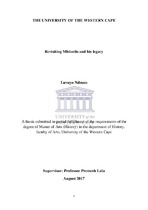| dc.contributor.advisor | Lalu, Premesh | |
| dc.contributor.author | Ndzuzo, Luvuyo | |
| dc.date.accessioned | 2018-04-06T12:56:02Z | |
| dc.date.available | 2018-04-06T12:56:02Z | |
| dc.date.issued | 2017 | |
| dc.identifier.uri | http://hdl.handle.net/11394/5891 | |
| dc.description | Magister Artium - MA (History) | |
| dc.description.abstract | The study attempts to recover the figure of King Charles Mhlontlo who fell out of favor with
his colonial masters after he resisted going to war against his neighbors during the debacle
that led to the killing of Hamilton Hope, magistrate of Qumbu in 1880. Three elements are
explored in the study. Firstly, I consider the contested figure of Mhlontlo and how history
writing presented and represented Mhlontlo in particular ways. Secondly, I consider the
presentation and representation of Mhlontlo with regard to the death of Hope in the archive
and the traditions of history writing that defines the king as a contested figure in the works of
history. Thirdly, I consider the particular tensions of remembering the past and how it is
recorded brought to the fore as a continuation to a Whig concept of history and how South
Africa especially the New South Africa tried to deal with the question of state and kingship in
terms of such an historiographical inheritance. At the heart of my interest in the Mpondomise
king is the question of how we are to read the post-apartheid state's independent commission
of enquiry' called the Nhlapo Commission that ruled on the future of relationships between
the monarchy and democratic institutions. The study questions the stance of the democratic
state in how it dealt with the question of traditional leadership by tracing its emergence in the
complex genealogy of the inheritance of Whig History. | |
| dc.language.iso | en | |
| dc.publisher | University of the Western Cape | |
| dc.title | Revisiting Mhlontlo and his legacy | |
| dc.rights.holder | University of the Western Cape | |

